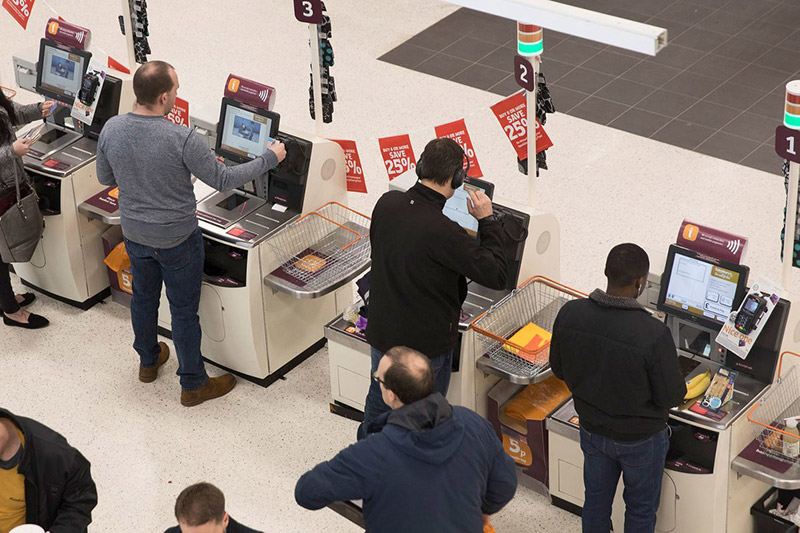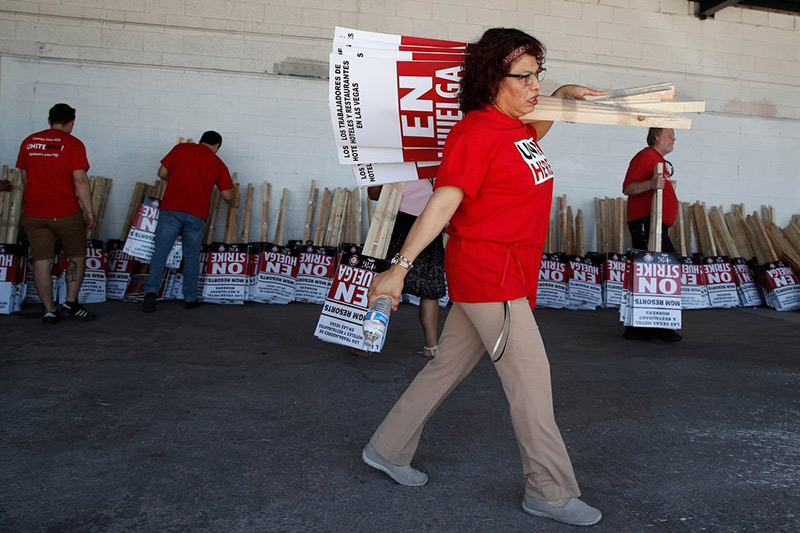|
几年前,万豪酒店在五个城市的酒店推出一款新应用,可以通知客房清洁工哪些房间需要打扫。本意是为了节省清扫人员时间,却变成一场灾难。 结果客房清洁工在不同楼层的房间之间疲于奔命,却顾不上走廊另一端凌乱的房间。从员工角度来说,他们觉得新应用反而降低了工作效率,还要担心因为没法按时完成工作受雇主惩罚。“简直是白费劲,”代表万豪清洁工的工会Unite Here女发言人瑞秋·古伯特如此描述。 工会得知新应用导致问题几个月后,万豪酒店的员工举行了罢工,部分原因就是针对客房管理应用等新技术。经过激烈的谈判,12月酒店员工获得了明显让步,新合同要求管理层提前165天通知应用新技术,以便处理相关疑问。 万豪签订的合同凸显了工会如何努力推动保护员工对抗无情闯入工作的新技术影响。最近,赌场员工、记者甚至职业篮球运动员都在就合同进行谈判,合同中规定了一些条款,比如重新培训因新技术下岗的工人,以及限制企业如何利用从设备中收集到的相关数据。 鲜有企业就该现象公开表态。例如,万豪只发表了一份声明,但拒绝评论,声明称万豪已调整了客房管理应用,以便员工更好地掌控日常工作。“酒店采取新流程时,我们通常会与同事合作,征求反馈意见,” 万豪表示。 马修·谢尔勒是Littler-Mendelson律师事务所专攻技术领域的律师,该事务所在劳动事务纠纷中代表企业方。他说,多数企业都忽视了员工对技术日益增长的担忧。谢尔勒表示,与公司客户交谈时,他建议认真对待员工的疑虑,这样管理人员可以在问题出现并影响业务之前解决。 “不太清楚美国公司会做出怎样的反应,也不清楚何时会出现所谓‘卫星时刻’,”马修·谢尔勒表示。他拒绝讨论公司代理的具体企业。 不管怎么说,大家都认同创新会导致一些工作消失,同时打开大门迎来新的就业机会。比如说,应对商店使用自动结账系统放弃人工收银员方面,战争就已经结束了。 |
A few years ago, Marriott debuted a new app at hotels in five cities that was supposed to save housekeepers time by telling them which rooms to clean. It was a disaster. Housekeepers ended up yo-yoing between rooms on different floors, ignoring messy rooms just down the hall. If anything, the cleaners felt that the app made them less efficient, and they worried about being disciplined by their bosses for failing to finish their work on time. “A wild-goose chase” is how Rachel Gumpert, a spokeswoman for Unite Here, the labor union that represents Marriott’s housekeepers, describes the episode. Several months after the union became aware of the problems the app was causing, Marriott’s hotel workers went on strike, partly because of new technologies like the housekeeping app. In December, after intense negotiations, the hotel workers won a remarkable concession—a new contract that requires management to tell them 165 days in advance about new technology so they can raise any concerns. The Marriott agreement highlights how unions are increasingly pushing to protect employees from the unrelenting march of technology into the workplace. Recently, casino workers, journalists, and even professional basketball players have negotiated contracts that dictate terms like retraining workers who are displaced by technology and limiting how businesses can use data they collect about employees from their devices. Corporations have said little publicly about the phenomenon. Marriott, for example, declined to comment beyond a statement that it has since modified its housekeeping app so that employees have more control over their daily work assignments. “It is customary for us to work with our associates and solicit feedback when implementing new procedures at our hotels,” Marriott said. Matthew Scherer, a lawyer who specializes in technology for law firm Littler¬ Mendelson, which represents corporations in labor matters, says that most businesses are oblivious to employees’ increasing worries about tech. When talking with corporate clients, Scherer says he recommends that they take worker misgivings seriously so that managers can address them before they bubble over and disrupt business. “It’s not entirely clear to me how corporate America is going to respond or when it’s going to have its Sputnik moment, as it were,” says Scherer, who declined to discuss specific companies his firm represents. Whatever the case, everyone agrees that innovation will eliminate some jobs while opening the door to newer ones. The battle is over how to cushion the impact of, say, stores switching to using self-checkout systems instead of employing human cashiers. |

|
过去,工人经常组织起来抵制新技术,有时甚至极力反抗,19世纪欧洲的裁缝就曾烧毁安装了新式电力织机的工厂。如今,工会领导人采取的抵抗方式则更加克制。 “工作不会消失,”美国最大的工会联盟AFL-CIO的政策和特别顾问达蒙·希尔佛表示。“将出现新的工作岗位,现有工作的内容也会改变。” 现在许多领导者都在潜心研究人工智能等话题,商业顾问也一样。西尔弗斯说,AFL-CIO已经会见卡内基梅隆大学、凯西大学和商业咨询巨头麦肯锡的专家,探讨技术对工人潜在的影响。经常有人讽刺工会落后于时代,现实却恰好相反。工会表示,关键在于不要阻止技术进步,要主动了解工人和企业应如何避免技术导致严重破坏。 工会也确实就技术和自动化进行了多年谈判。(看看汽车工业就知道)但现在斗争越发围绕软件而不是工业机器人,而数十年来机器人曾夺走大量工作。 凯莉·格里森在大众民主中心领导“公平工作周”倡议,她表示零售行业里负责安排员工工作时间的软件是关键所在。该软件可根据商店繁忙或空闲的时间安排员工,实现所谓的准时劳动力。 然而问题在于,商店经理使用软件给员工排班时,经常安排每天工作短短几小时,而不让员工一次上班时间长一些,然后能有机会休息整天。因此,许多员工完全没法预计上班时间,只能24小时随叫随到,也很难找到兼职。 作为回应,一些代表零售业员工的工会最近就合同进行了谈判,明确管理层使用调度软件的方式,避免干扰员工的生活。一个例子是,2014年United Food and Commercial Workers Local 5与梅西零售公司签订了合同,要求提前通知员工时间表以及任何变更。 2017年的合同谈判中,代表NBA球员的国家篮球运动员协会针对的是可穿戴设备。工会规定,禁止球队在某些情况下利用健身追踪器中收集球员的健康和表现数据。 举例来说,训练或比赛中收集的心率信息可能显示运动员身体不适。根据规则,团队在比赛期间可以使用相关数据协助制定策略。但跟NBA球员个人谈判合同时则不能用数据说事,因为正如NBA联盟副总顾问大卫·福斯特解释,数据显示的信息可能不准确。 当然了,现实情况是美国大多数员工并不具备NBA球星的议价能力。非工会企业可以自由使用任何技术,包括收集和分析有关员工绩效的数据,只要不涉及种族和性别等因素。 例如,营销公司可以跟踪员工在电脑上的打字时间评估业绩。打字越多业绩表现也就越佳。 “随着机器学习越来越强大,通过技术监控员工成本越来越低,也越发容易,” 坦普尔大学法学教授布里森·罗杰斯表示。“公司将收集更多员工表现方面的数据,还会尽可能利用数据降低劳动力成本。” 代表记者的纽约新闻协会与新闻机构就通过数据评估绩效进行了谈判。工会关注的是,许多记者的业绩与文章的网络点击量挂钩,工会组织主任纳斯塔兰·莫希特称此举为“比拼谁底线更低”。 新闻协会表示,接受当今数字世界的现实,但雇主应该根据记者的工作质量评估业绩,不要定量安排。因为设定的工作量可能因谷歌或Facebook突然改变算法受到负面影响。 莫希特表示,新闻协会能争取不提定量安排工作,或者限制在少数新闻机构内。例如,法律新闻社Law360曾要求其记者每天写四篇报道,不允许例外情况。莫希特在一封电子邮件中称之为新闻业定量安排工作 “最苛刻也最有问题”的案例之一。 她说,2016年Law360员工终于加入工会后,员工“第一件事便是放松定额工作量,最后彻底取消”。Law360的母公司LexisNexis拒绝置评。 |
In the past, workers have often organized to resist new technology and, in some cases, even to rebel against it, as in the 19th century when tailors in Europe burned down factories filled with newfangled power looms. But these days, union leaders are taking a more measured approach. “Work is not going away,” says Damon Silvers, the director of policy and special counsel for the AFL-CIO, the largest union federation in the U.S. “There will be new jobs created, and the content of existing jobs will change.” These days, many leaders immerse themselves in topics like artificial intelligence—much like business consultants. Silvers says that the AFL-CIO has met with experts from Carnegie Mellon University, Case Western University, and business consulting giant McKinsey to discuss technology’s potential disruption to workers. It’s a far cry from the caricature of unions as being behind the times. The point is not to stop technological progress, the unions say, but rather to understand what workers and businesses can do to avoid major disruption caused by technology. To be sure, unions have negotiated over technology and automation for years. (Just look at the auto industry.) But now the fight is increasingly over software rather than industrial robots, a big job killer for decades. In the retail industry, software for scheduling employee hours is a big sticking point, says Carrie Gleason, who directs the Fair Workweek Initiative at the advocacy group The Center for Popular Democracy. The technology weighs the hours when stores are expected to be busy or empty to schedule workers, creating a so-called just-in-time workforce. One problem, however, is that store managers often use the software to slot employees in short blocks of a few hours rather than giving them additional tasks to do during slower periods so they have a full day. As a result, many employees end up with unpredictable schedules that require them to be on call around the clock, thus making it difficult for them to get second jobs. In reaction, some unions representing retail workers have recently negotiated contracts that spell out how management can use scheduling software, to avoid disrupting the lives of employees. One example is a 2014 contract between the United Food and Commercial Workers Local 5 and retail firm Macy’s that requires advance notice to workers about their schedules and any changes to them. In its contract negotiations in 2017, the National Basketball Players Association, which represents NBA players, targeted wearable devices. The union was able to establish rules that prohibit teams, in certain situations, from using player health and performance data that they glean from fitness trackers. Heart rate information collected during training or games may show that a player is out of shape, for instance. Under the rules, teams can use this data to help strategize during games. But they can’t factor it in when negotiating individual NBA player contracts because, as the NBA union’s deputy general counsel David Foster explains, the information may be inaccurate. The reality, of course, is that most U.S. workers don’t have the bargaining power of NBA stars. Non-unionized companies are free to use any technology they want, including gathering and analyzing data about employee performance, as long as it doesn’t touch on factors like race and gender. For instance, a marketing firm could track how much time employees type on their computers to gauge their performance. The more they‘re at their keyboards, the better. “As machine learning becomes more powerful, it will be cheaper and easier to monitor workers in that way,” said Brishen Rogers, a law professor at Temple University. “Companies are going to be gathering more and more data about how employees are preforming on their job and they will use that data to reduce labor costs wherever they can.” The NewsGuild of New York, which represents journalists, has bargained with publishers over the use of data to measure employee performance. The union is concerned that many reporters are being evaluated by how many clicks their articles get online, which Nastaran Mohit, the union’s organizing director, calls a “race to the bottom.” The NewsGuild says it accepts the reality of today’s digital world. But it believes that employers should measure journalists by the quality of their work and not by quotas that can be negatively affected by Google or Facebook suddenly changing their algorithms. Ultimately, the guild has been able to secure language that eliminate quotas or reduce them at a number of publications, Mohit says. For instance, the legal news service Law360 once required its reporters to write four stories a day with no exception, a mandate that Mohit referred to in an email as one of the most “demanding and problematic” examples of story quotas in journalism. Eventually after Law360 workers unionized in 2016, the employees were able to “first loosen their quotas, and then eventually remove them altogether,” she said. Lexis-Nexis, Law360’s parent company, declined to comment. |

|
不仅蓝领工人担心技术的影响。会计师或律师助理之类白领工人也一样担心,这些人通常不是工会成员,而且一般来说不用担心技术问题,但如今人工智能支持的软件可以帮客户计算税收或处理法律研究问题,所以同样面临风险。 “现在白领阶层焦虑情绪严重,”哈佛商学院教授威廉·克尔说。 加州大学伯克利分销劳动力中心的低工资工作项目主任安妮特·伯恩哈特说,到最后工会可能敦促立法者以更广泛的方式解决科技对劳动力的影响。 “我们发现工会已率先深入探讨相关问题,但决策者和我们公众也要尽快加入讨论,” 伯恩哈特表示。 最近谷歌员工抗议公司存在的性骚扰和仲裁政策,但并无工会组织,表明一些白领工人也在模仿工会的策略努力改变公司政策。谷歌的回应是取消了一项规定,此前规定是指责公司存在性骚扰的员工必须走仲裁而不是通过法院系统。 不管怎样,万豪酒店的客房清洁工也通过最近的合同获得了一些保护,条款比较接近去年工会代表拉斯维加斯赌场员工谈判的合同。合同要求万豪向工会提供新技术的信息,还要保证为辞退的员工提供工作培训。 如此一来,客房清洁工可转型当厨师,在同一家酒店或附近的酒店工作。常驻旧金山的联合主席安纳德·辛哈表示,合同的措辞囊括了未来两种情况下技术的影响,一种是比如机器人可以打扫房间的情形,另一种则更贴近当下,比如让客房清洁工很愤怒的应用程序之类。 “我们没法提供所有的答案,”他承认。不过,“确实不能仅依靠一些先进的装置重新定位和训练美国人。”(财富中文网) 本文另一版本发表于2019年5月出版的《财富》杂志,标题是《当技术和劳动力出现冲突》。 译者:冯丰 审校:夏林 |
And it’s not just blue-collar workers who are worried about technology’s impact. White-collar workers like accountants or paralegals, who aren’t typically union members and, generally, have never had to fear technology, are at risk because of software powered by artificial intelligence that can calculate taxes for clients or handle legal research. “There’s so much anxiety these days among the white-collar class,” said Harvard Business School professor William Kerr. Annette Bernhardt, the director of the low-wage work program at the University of California at Berkeley’s Labor Center, said unions may eventually push lawmakers to address tech’s impact on the workforce in more sweeping ways. “What we’re seeing is that unions are the first to dive into these questions, but very quickly policy makers and we as the public are going to have to have this debate as well,” says Bernhardt. Recent protests by Google employees, who aren’t unionized, against the search giant’s sexual harassment and arbitration policies shows that some white-collars laborers are mimicking union tactics to change company policy. Google responded by eliminating a policy that required workers who accused the company of sexual harassment of going through arbitration rather than the court system. In any case, Marriott’s housekeepers were able to win some protections in their recent contract, which was similar to one their union negotiated last year on behalf of Las Vegas casino workers. In addition to requiring that Marriott give the union a heads-up about any new technology, it guarantees job training for anyone who is displaced. A housekeeper could become a cook, for example, and be put to work at the same hotel or one nearby. The contract language covers disruption from both futuristic scenarios like robots that can clean rooms, to more present-day ones like the app that infuriated the hotel’s housekeepers, says Anand Singh, a Unite Here president in San Francisco. “We don’t have all the answers,” he concedes. However, “you can’t just count on some magical apparatus to reposition and retrain Americans.” A version of this article appears in the May 2019 issue of Fortune with the headline “When Tech and Labor Collide.” |






